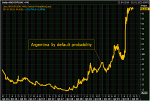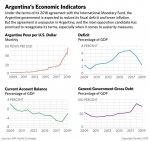Plain Jane
Just Plain Jane
https://www.apnews.com/6a5bb35c4c1a44c8960741bcf5a6305c
Argentina’s Peronists seek return in polarized election
By ALMUDENA CALATRAVA and DÉBORA REY
October 25, 2019
BUENOS AIRES, Argentina (AP) — Frustration over a bruising economic crisis and rising poverty has eroded support for Argentina’s pro-business incumbent ahead of Sunday’s presidential election and boosted a populist challenger whose victory would mark a tilt to the center-left in a region rocked by political upheaval.
Polls have President Mauricio Macri trailing Peronist party candidate Alberto Fernández, whose surge has rattled financial markets and drawn attention to a possible return to high office of his vice presidential running mate - former President Cristina Fernández.
Macri took office in 2015 promising to root out corruption and eliminate poverty but is now seeking a second term amid increasing poverty, a sharp depreciation of Argentina’s peso and one of the world’s worst inflation rates.
He is shouldering most of the blame from voters for the economic woes and they made their frustration clear in primaries in August, when Macri’s share of the votes cast trailed Fernández by a nearly 16-percentage point margin. Argentina’s unique party primaries - in which all voters cast ballots - are seen as a barometer of support for candidates ahead of its presidential election.
The surprisingly poor performance by Macri caused stocks to plunge and the peso depreciated even more on the possibility of a return to the interventionist economic policies of Cristina Fernández, who governed Argentina from 2007 to 2015. Alberto Fernández was her chief of staff early in her first term. The two are not related.
In a recent interview with The Associated Press, Alberto Fernández dismissed concerns by investors and some Argentines that he would be unduly influenced by his former boss.
“I don’t see a conflict there,” he said. “Argentina’s problem is not Cristina. It’s what Macri has left behind.”
Virtually all recent polls have given Fernández more than 50% support, which would give him a first round victory without a runoff vote.
A win by the Fernández ticket would mark a shift leftward in South America, which has seen conservative governments elected in Brazil, Colombia and Chile in recent years. Cristina Fernández was seen as a member of the “pink tide” of leftist governments that arose in the region in the 1990s and 2000s. Now the region is being rocked by unrest in Chile, Bolivia, Peru and Ecuador fueled by popular discontent with the status quo.
Macri is credited with returning Argentina to global credit markets for the first time since its worst economic crisis in 2001-2002. Mariel Fornoni, director of the consultancy Management & Fit, said the president also has opened new markets for Argentina around the world, strengthened its institutions and improved security.
But his main failure has been the economy, Fornoni said. The World Bank forecasts that Argentina’s economy will contract 3.1% this year. More than a third of the country is poor, unemployment is at 10.6%, and inflation is expected to hit 55% this year.
“Poverty has become a big problem,” Alberto Fernández said. He promised to rebuild the economy by pursuing “a policy of agreements” among different economic and social sectors.
Argentina’s economy improved slightly in 2017. Then a severe drought damaged crops in the country, which is one of the world’s top suppliers of grains. The economy suffered another blow when the trade war between the United States and China led investors to pull back from emerging markets like Argentina.
Faced with a weakening peso, Macri was forced to seek a record $56 billion bailout loan from the International Monetary Fund. The unpopular move brought back bad memories for Argentines who blame the IMF for encouraging policies that led to the country’s economic crisis nearly two decades ago.
On the campaign trail, Macri has pleaded for more time to reverse fortunes and reminds voters of the corruption cases facing Cristina Fernández, who has denied any wrongdoing.
She remains popular but divisive. While her supporters believe she led the country out of its worst economic meltdown, others feel her policies created the conditions that led to the current turmoil.
She remains popular but divisive. While her supporters believe she led the country out of its worst economic meltdown, others feel her policies created the conditions that led to the current turmoil.
Negative feelings also weigh heavily on Macri.
“You have to understand the urgency today, with 35% who are living in poverty ... you can’t be worried about other things if you’re having trouble feeding yourself,” Fornoni said.
Many Argentines are also angry over Macri’s decision to cut subsidies, leading to a spike in the costs of utilities and public transportation.
Magalí Sánchez, an unemployed nurse in Buenos Aires, said her rent recently jumped 15%, too much for a middle class family that has been hit hard by increases in light, gas and food prices.
“We’re fighting not to end up on the street,” Sánchez told The Associated Press.
“I saw this coming when Macri won,” said Juan Lugones, Sanchez’s husband. “I thought, ‘This is going to ruin us.’”
Patricio Giusto, of the consultancy Diagnostico Politico, said disenchantment with Macri is “very striking” among Argentines between the ages of 25 and 35 who had expected the president to tame the high inflation and other problems left by Cristina Fernández’s government, but now feel disillusioned by rising prices and their shrinking buying power.
Argentina’s Peronists seek return in polarized election
By ALMUDENA CALATRAVA and DÉBORA REY
October 25, 2019
BUENOS AIRES, Argentina (AP) — Frustration over a bruising economic crisis and rising poverty has eroded support for Argentina’s pro-business incumbent ahead of Sunday’s presidential election and boosted a populist challenger whose victory would mark a tilt to the center-left in a region rocked by political upheaval.
Polls have President Mauricio Macri trailing Peronist party candidate Alberto Fernández, whose surge has rattled financial markets and drawn attention to a possible return to high office of his vice presidential running mate - former President Cristina Fernández.
Macri took office in 2015 promising to root out corruption and eliminate poverty but is now seeking a second term amid increasing poverty, a sharp depreciation of Argentina’s peso and one of the world’s worst inflation rates.
He is shouldering most of the blame from voters for the economic woes and they made their frustration clear in primaries in August, when Macri’s share of the votes cast trailed Fernández by a nearly 16-percentage point margin. Argentina’s unique party primaries - in which all voters cast ballots - are seen as a barometer of support for candidates ahead of its presidential election.
The surprisingly poor performance by Macri caused stocks to plunge and the peso depreciated even more on the possibility of a return to the interventionist economic policies of Cristina Fernández, who governed Argentina from 2007 to 2015. Alberto Fernández was her chief of staff early in her first term. The two are not related.
In a recent interview with The Associated Press, Alberto Fernández dismissed concerns by investors and some Argentines that he would be unduly influenced by his former boss.
“I don’t see a conflict there,” he said. “Argentina’s problem is not Cristina. It’s what Macri has left behind.”
Virtually all recent polls have given Fernández more than 50% support, which would give him a first round victory without a runoff vote.
A win by the Fernández ticket would mark a shift leftward in South America, which has seen conservative governments elected in Brazil, Colombia and Chile in recent years. Cristina Fernández was seen as a member of the “pink tide” of leftist governments that arose in the region in the 1990s and 2000s. Now the region is being rocked by unrest in Chile, Bolivia, Peru and Ecuador fueled by popular discontent with the status quo.
Macri is credited with returning Argentina to global credit markets for the first time since its worst economic crisis in 2001-2002. Mariel Fornoni, director of the consultancy Management & Fit, said the president also has opened new markets for Argentina around the world, strengthened its institutions and improved security.
But his main failure has been the economy, Fornoni said. The World Bank forecasts that Argentina’s economy will contract 3.1% this year. More than a third of the country is poor, unemployment is at 10.6%, and inflation is expected to hit 55% this year.
“Poverty has become a big problem,” Alberto Fernández said. He promised to rebuild the economy by pursuing “a policy of agreements” among different economic and social sectors.
Argentina’s economy improved slightly in 2017. Then a severe drought damaged crops in the country, which is one of the world’s top suppliers of grains. The economy suffered another blow when the trade war between the United States and China led investors to pull back from emerging markets like Argentina.
Faced with a weakening peso, Macri was forced to seek a record $56 billion bailout loan from the International Monetary Fund. The unpopular move brought back bad memories for Argentines who blame the IMF for encouraging policies that led to the country’s economic crisis nearly two decades ago.
On the campaign trail, Macri has pleaded for more time to reverse fortunes and reminds voters of the corruption cases facing Cristina Fernández, who has denied any wrongdoing.
She remains popular but divisive. While her supporters believe she led the country out of its worst economic meltdown, others feel her policies created the conditions that led to the current turmoil.
She remains popular but divisive. While her supporters believe she led the country out of its worst economic meltdown, others feel her policies created the conditions that led to the current turmoil.
Negative feelings also weigh heavily on Macri.
“You have to understand the urgency today, with 35% who are living in poverty ... you can’t be worried about other things if you’re having trouble feeding yourself,” Fornoni said.
Many Argentines are also angry over Macri’s decision to cut subsidies, leading to a spike in the costs of utilities and public transportation.
Magalí Sánchez, an unemployed nurse in Buenos Aires, said her rent recently jumped 15%, too much for a middle class family that has been hit hard by increases in light, gas and food prices.
“We’re fighting not to end up on the street,” Sánchez told The Associated Press.
“I saw this coming when Macri won,” said Juan Lugones, Sanchez’s husband. “I thought, ‘This is going to ruin us.’”
Patricio Giusto, of the consultancy Diagnostico Politico, said disenchantment with Macri is “very striking” among Argentines between the ages of 25 and 35 who had expected the president to tame the high inflation and other problems left by Cristina Fernández’s government, but now feel disillusioned by rising prices and their shrinking buying power.
Last edited:


